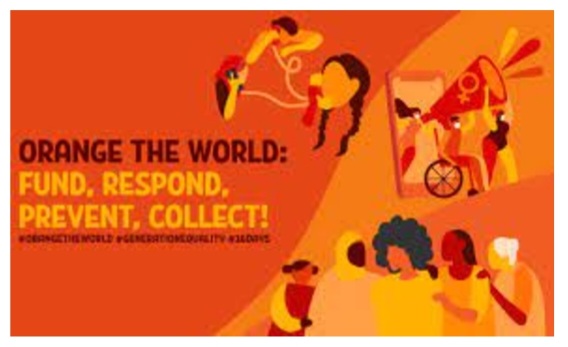One in every three women (1 in 3) have experienced some form of violence in their lifetime, some even more. This statistic comes down to an average 736 million women all over the world who have suffered or a suffering from violence
Every year, the 16 Days of Activism campaign calls for united, global action to end all forms of violence against women and girls, VAWG.
One in every three women (1 in 3) have experienced some form of violence in their lifetime, some even more. This statistic comes down to an average 736 million women all over the world who have suffered or a suffering from violence. Violence against Women & Girls is the elephant in the room, the silent epidemic that hardly ever gets spoken of as a result of the of silence it is cloaked in. Violence against Women and Girls is one of the ills prevalent in every society that is hardly talked about, often ignored and normalized.
However, its impact is multifaceted, sporadic, deep and far reaching. It begins with the victim, manifesting in several ways, – mental health issues, medical bills, and even STDs in the cases of sexual violence. But it does not stop with only the victim, it trickles down to affect her children, her family, and the entire society. This makes VAWG both a human right as well as a public health concern.
That is why at the inauguration of the Women’s Global Leadership Institute in June 1991, activists initiated and started the campaign as an organizing strategy for organizations and individuals to call for the preventions and elimination of violence against women and girls, beginning on the 25th of November to the 10th of December every year.
The campaign and fight against violence against women and girls is a defeated one, unless there is adequate funding and support to see it through. That is why the theme of this year’s campaign is ‘UNITE, INVEST to Prevent Violence against Women & Girls; because funding is key.
In 2022, the UN fund and worked with 186 civil society organizations across 70 countries on the prevention and elimination of violence against women and girls in with grants totaling $87.8m.
That is not nearly enough to get the job done. There are 195 countries in the world, the grants and support did not cover even half of what is needed. There is an urgent need for robust funding, essential services and financial prevention initiatives and data collection that will shape better informed responses.
VAWG affects everyone either directly or indirectly. Therefore, fighting to end it is everyone’s business and not a singular job. There is a role and responsibility for everyone to play, individuals and organizations alike. Government, decisions makers and society stakeholders MUST implement and enforce the policies and laws that protect the rights, dignity and safety of women and girls. Corporate organizations should conduct programs to create awareness and sensitize people about it, or fund and support civil society organizations working in the space, and collaborate with stakeholders.
Individuals can support this fight through a variety of different ways. The UN has listed out some ways and means this can be achieved by:
1. Listen and believe survivors: Every harmful negative practice thrives in secrecy, VAWG inclusive. The culture of silence with which it is enshrouded gives it the cover and safety it needs to grow and spread. The first step required to break the cycle of abuse is ‘breaking the silence’. When anyone shares their story of abuse. But that can only happen in a safe and healthy space where the victim feels safe and heard. It is our responsibility to create these safe spaces so that victims of violence can feel safe to speak up and seek help. It is important to always remember that a victim’s clothes, sobriety or demeanor is never the cause of sexual violence, but the perpetrator is, and only they must bear the responsibility. Desist from victim blaming and thumping the idea that it is women who put themselves in situations that gets them assaulted in anyway.
Recently, more and more survivors are speaking up, it is our responsibility to ensure they get justice and that perpetrators of violence pay for the crimes they commit against humanity.
Instead of saying ‘why didn’t you leave? Say ‘we hear you. We believe you. We stand with you’.
2. Teach the next generation and learn from them because the examples we set for them shape the way they think about gender, respect and human rights. Hold conversations about gender roles and stereotypes. Challenge unfair traditional features and characteristics assigned to men and women. Point out visible stereotypes that children encounter in the media, on the streets or at school and assure them that it is okay to be different. Encourage them to be self-accepting.
Educate them about consent, bodily anatomy and accountability in an age-appropriate way to both genders. Make them understand their body is theirs and only they have the responsibility to determine what happens to it. Discuss the importance of a clear YES from all involved, and taking responsibility for one’s actions.
It is also important to listen to children and hear what they say about their experience of the world. This empowers them to grow into young advocates with information and educating them about women’s rights and building a better future for all.
3. Respect and understanding of consent: In every circumstance, consent is mandatory; EVERYTIME. Tell everyone; and teach the young ones that rather than listening for a NO; they should ensure there is a clear YES, every time. Make ‘clear consent’ a guiding principle. Do not blur the lines around sexual assault and consent by placing the blame on the victims and excusing perpetrators from their crimes with phrases lie ‘she asked for it’ or ‘boys will be boys’.
4. Amplify call for response and services for victims and survivor. This will ensure that helplines, counselling, shelters and every support necessary for survivors will be made available for those in need.
5. Learn the signs of abuse and how you can help: There are different and many forms of abuse all of which have serious physical, psychological and emotional effects. If you are concerned about a family member or friend experiencing violence or feels unsafe around someone, review the signs to learn about the ways to help them find safety and support.
6. Understand that violence against women and girls is a human rights violation which is pervasive and have been perpetuated for decades and hold conversations around that. It is only inevitable when we stay silent.
7. Stand up against rape culture as it is the social environment that allows it by normalizing and justifying with baseless reasons of persistent gender inequalities and attitudes about gender and sexualities. We must continue to examine and analyze the attitudes, behaviors and biases that permit rape culture to continue because how we each define masculinity and femininity, our biases and stereotypes influence our behaviors.
We can all stand and act to end rape culture by the beliefs and attitudes we have about gender identities and the policies we support in our communities.
8. Sexual harassment in the workplace and tertiary institutions and public places is another form of violence. Catcalling, inappropriate sexual comments, and sexist jokes are also violence. It is therefore your responsibility to take a stand by calling it out when you see it, Find and fund women organizations that supports, empower and uplifts women in your community. Create a safer environment by challenging your peers to reflect on their own behavior and speak up when someone crosses the line. Do not hesitate to enlist the help of others if you don’t feel safe. Always listen to survivors and make sure they have the support they need.
9. Research, study and ask questions because to effectively combat any ill, we need to understand it. Violence against women and girls is not any different. Data collection is key to implementing successful prevention measures and providing survivors with the right support, it is therefore important to know and understand all data, and demand more of it. Call on your Government to invest in the collection of data in violence against women and girls and every form of gender-based violence.
UNITE, INVEST to Prevent Violence against Women & Girls; is the theme of this years 16 days action on Violence against women & Girls because funding is KEY to every impact, success and result. The UN and its partners are demanding increased investment to end violence against women and girls from Governments, private organizations and stakeholders so as to achieve prevention initiatives, ensure essential services for survivors of violence, implement prevention measures and invest in the collection of necessary data to adapt and improve lifesaving services for women and girls.
If we all unite our efforts, rally our actions, amplify our voices, we are going to end violence against women and girls by investing our time, energy, resources.
“Unite, Invest to Prevent Violence against Women and Girls”
Be a voice for the voiceless.
Be a support to those who lack it.
Be the harbinger of hope, for those who are in dire need of it.
Stand to end VAWG.
Hawwah A Gambo
Founder/CEO Sheroes Rising Development Initiative
HoR Candidate Chikun/Kajuru Federal Constituency.




